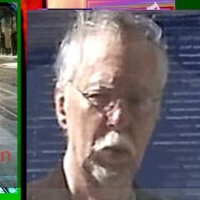Bass Sheet Music
 "... I don't want you to play me a riff that's going to impress Joe Satriani; give me a riff that makes a kid want to go out and buy a guitar and learn to play ..." Ozzy Osbourne
"... I don't want you to play me a riff that's going to impress Joe Satriani; give me a riff that makes a kid want to go out and buy a guitar and learn to play ..." Ozzy Osbourne
Michel Corette
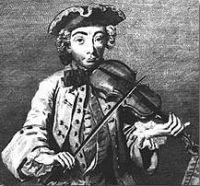
Michel Corrette (10 April 1707 – 21 January 1795) was a French composer, organist and author of musical method books.[2Corrette was prolific. He composed ballets and divertissements for the stage, including Arlequin, Armide, Le Jugement de Midas, Les Âges, Nina, and Persée. He composed many concertos, notably 25 concertos comiques. Aside from these works and organ concertos, he also composed sonatas, songs, instrumental chamber works, harpsichord pieces, cantatas, and other sacred vocal works. Most of his sacred works have not survived, some exceptions being the Laudate Dominum and Four Masses for Two Voices from 1788.Despite living well into the Classical era (he outlived Mozart by four years, dying in 1795 just a few months short of 88), Corrette's musical idiom was very conservative, and he continued to compose in the Baroque style at least up to the 1770s.
Toto
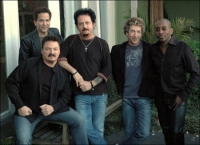
Toto was a Grammy Award winning American rock band founded in 1977 by some of the most popular and experienced session musicians of the era. The band enjoyed great commercial success in the 1980s, beginning with the band's self-titled debut, released in 1978, which immediately brought the band into the mainstream rock spectrum of the time. Continuing with 1982's critically acclaimed and commercially successful Toto IV, Toto became one of the biggest selling music groups of their era. They also composed the theme music for the film Dune. Although their popularity in the United States diminished in the 1990s and 2000s, they continued to tour to sold out arenas, clubs, and theaters internationally. Toto was known for their technical prowess in the studio, as well as a musical style that combines elements of pop, rock, soul, funk, progressive rock, hard rock, R&B, and jazz, making them appeal to a variety of musicians and non-musician listeners. The band has released 17 albums and has sold over 30 million records to date. Their 18th release Falling In Between Live, was released in August 2007. It had been recorded in March 2007 in Paris. As a result of guitarist Steve Lukather's departure from the band, Toto broke up after the last leg of their 2008 tour.
Clifford Brown
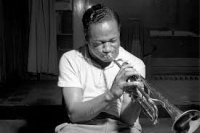
Clifford Brown, American jazz trumpeter. In 1953 he entered the Lionel Hampton orchestra. In 1954, together with drummer Max Roach, he formed a quintet that quickly became famous. It has established itself with its powerful work, richness of inventions and beautiful timbre. His style is a transition between "bop" and "cool".
Yasunori Mitsuda
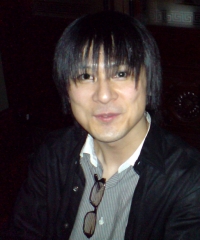
Yasunori Mitsuda (光田 康典 Mitsuda Yasunori?, born January 21, 1972) is a Japanese video game composer, sound programmer, and musician. He has composed music for or worked on over 35 games, and has contributed to over 15 other albums. He is best known for his compositions for the video games Chrono Trigger, Chrono Cross, Shadow Hearts, Shadow Hearts: Covenant, Xenogears, Xenosaga Episode I, and Mario Party. He began composing video game music for his own games in high school, and after graduation attended Junior College of Music in Tokyo. In 1992 upon graduation he joined Square (now Square Enix) as a composer after seeing a magazine advertisement in an office he was visiting with his professor.
Despite his job title as a composer, Mitsuda worked for two years as a sound engineer. In 1994, after threatening to quit to Square's vice president, Hironobu Sakaguchi, he was assigned to compose the soundtrack to Chrono Trigger. After the game's success and the music's acclaim, he went on to compose several other games for Square, including Xenogears. In 1998 Mitsuda left Square to work as a freelance composer, founding his own music production studio, Procyon Studio, in 2001 as well as his own record label, Sleigh Bells. The company has since expanded to nine employees, and Mitsuda continues to compose for video games, as well as for anime series and his own independent albums.
Despite his job title as a composer, Mitsuda worked for two years as a sound engineer. In 1994, after threatening to quit to Square's vice president, Hironobu Sakaguchi, he was assigned to compose the soundtrack to Chrono Trigger. After the game's success and the music's acclaim, he went on to compose several other games for Square, including Xenogears. In 1998 Mitsuda left Square to work as a freelance composer, founding his own music production studio, Procyon Studio, in 2001 as well as his own record label, Sleigh Bells. The company has since expanded to nine employees, and Mitsuda continues to compose for video games, as well as for anime series and his own independent albums.
J. S. Bach
Johann Sebastian Bach (21 March 1685, O.S.31 March 1685, N.S. – 28 July 1750, N.S.) was a German composer, organist, harpsichordist, violist, and violinist whose sacred and secular works for choir, orchestra, and solo instruments drew together the strands of the Baroque period and brought it to its ultimate maturity. Although he did not introduce new forms, he enriched the prevailing German style with a robust contrapuntal technique, an unrivalled control of harmonic and motivic organisation, and the adaptation of rhythms, forms and textures from abroad, particularly from Italy and France.
Revered for their intellectual depth, technical command and artistic beauty, Bach's works include the Brandenburg Concertos, the Goldberg Variations, the Partitas, The Well-Tempered Clavier, the Mass in B minor, the St Matthew Passion, the St John Passion, the Magnificat, A Musical Offering, The Art of Fugue, the English and French Suites, the Sonatas and Partitas for solo violin, the Cello Suites, more than 200 surviving cantatas, and a similar number of organ works, including the famous Toccata and Fugue in D minor and Passacaglia and Fugue in C minor, as well as the Great Eighteen Chorale Preludes and Organ Mass.
Bach's abilities as an organist were highly respected throughout Europe during his lifetime, although he was not widely recognised as a great composer until a revival of interest and performances of his music in the first half of the 19th century. He is now generally regarded as one of the main composers of the Baroque style, and as one of the greatest composers of all time.
Revered for their intellectual depth, technical command and artistic beauty, Bach's works include the Brandenburg Concertos, the Goldberg Variations, the Partitas, The Well-Tempered Clavier, the Mass in B minor, the St Matthew Passion, the St John Passion, the Magnificat, A Musical Offering, The Art of Fugue, the English and French Suites, the Sonatas and Partitas for solo violin, the Cello Suites, more than 200 surviving cantatas, and a similar number of organ works, including the famous Toccata and Fugue in D minor and Passacaglia and Fugue in C minor, as well as the Great Eighteen Chorale Preludes and Organ Mass.
Bach's abilities as an organist were highly respected throughout Europe during his lifetime, although he was not widely recognised as a great composer until a revival of interest and performances of his music in the first half of the 19th century. He is now generally regarded as one of the main composers of the Baroque style, and as one of the greatest composers of all time.
Alexander Scriabin
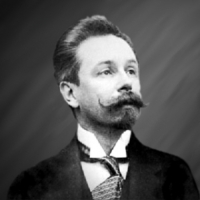
Alexander Nikolayevich Scriabin (/skriˈæbɪn/; Russian: Алекса́ндр Никола́евич Скря́бин; 6 January 1872 – 27 April 1915) was a Russian composer and pianist. Scriabin's early work is characterised by a lyrical and idiosyncratic tonal language influenced by Frédéric Chopin. Later in his career, independently of Arnold Schoenberg, Scriabin developed a substantially atonal and much more dissonant musical system, accorded to mysticism. Scriabin was influenced by synesthesia, and associated colors with the various harmonic tones of his atonal scale, while his color-coded circle of fifths was also influenced by theosophy. He is considered by some to be the main Russian Symbolist composer.
Scriabin was one of the most innovative and most controversial of early modern composers. The Great Soviet Encyclopedia said of Scriabin that, "No composer has had more scorn heaped or greater love bestowed..." Leo Tolstoy once described Scriabin's music as "a sincere expression of genius." Scriabin had a major impact on the music world over time, and influenced composers like Roy Agnew, Nikolai Roslavets, Sergei Prokofiev and Igor Stravinsky. Scriabin's importance in the Soviet musical scene, and internationally, drastically declined. "No one was more famous during their lifetime, and few were more quickly ignored after death." In the 1970s, for instance, there were only three recordings of his complete (published) sonatas. Yet Scriabin's work has steadily regained popularity in recent years.
Scriabin was one of the most innovative and most controversial of early modern composers. The Great Soviet Encyclopedia said of Scriabin that, "No composer has had more scorn heaped or greater love bestowed..." Leo Tolstoy once described Scriabin's music as "a sincere expression of genius." Scriabin had a major impact on the music world over time, and influenced composers like Roy Agnew, Nikolai Roslavets, Sergei Prokofiev and Igor Stravinsky. Scriabin's importance in the Soviet musical scene, and internationally, drastically declined. "No one was more famous during their lifetime, and few were more quickly ignored after death." In the 1970s, for instance, there were only three recordings of his complete (published) sonatas. Yet Scriabin's work has steadily regained popularity in recent years.
Jazz Standard
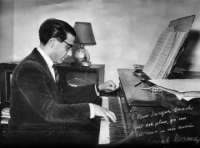
Autumn Leaves" is a popular song and jazz standard composed by Joseph Kosma with original lyrics by Jacques Prévert in French, and later by Johnny Mercer in English. An instrumental version by pianist Roger Williams was a #1 best-seller in the USA Billboard charts of 1955.
Music theory

Music theory is the study of the practices and possibilities of music. The Oxford Companion to Music describes three interrelated uses of the term "music theory"
Frank Zappa
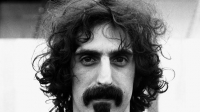
Frank Vincent Zappa Jr. American guitarist, singer, composer. He was born a Sicilian father and a Franco-Italian mother.
Date of birth: December 21, 1940, Baltimore, Maryland, United States Date and place of death: December 4, 1993, Hollywood Hills, Los Angeles, California, USA
Date of birth: December 21, 1940, Baltimore, Maryland, United States Date and place of death: December 4, 1993, Hollywood Hills, Los Angeles, California, USA
Thierry Chauve

Thierry Chauve Musical artist Record label: Thierry Chauve Albums: Sable Et Corail, Voix Des Anges Songs Le Rappeur Du Futur Le Rappeur Du Futur · 2017 La Poésie 2 Sable Et Corail · 2017 Slam Electro Voix Des Anges · 2017
Aretha Franklin
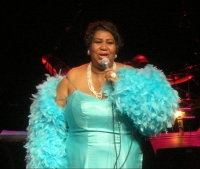
Aretha Louise Franklin (born March 25, 1942) is an American singer, songwriter and pianist self-named and commonly referred to as "The Queen of Soul". Although renowned for her soul recordings, Franklin is also adept at jazz, rock, blues, pop, R&B and gospel. In 2008, the American music magazine Rolling Stone ranked Franklin #1 on its list of The Greatest Singers of All Time.
Franklin is one of the most honored artists by the Grammy Awards, with 20 Grammys to date, which include the Living Legend Grammy and the Lifetime Achievement Grammy. She has scored a total of 20 #1 singles on the Billboard R&B Singles Chart, two of which also became #1 hits on the Billboard Hot 100: "Respect" (1967) and "I Knew You Were Waiting (For Me)" (1987), a duet with George Michael. Since 1961, Franklin has scored a total of 45 "Top 40" hits on the Billboard Hot 100 chart.
In 1987, Franklin became the first female artist to be entered into the Rock and Roll Hall of Fame.
Franklin was the featured singer at the 2009 Presidential inauguration ceremony for Barack Obama.
Franklin is one of the most honored artists by the Grammy Awards, with 20 Grammys to date, which include the Living Legend Grammy and the Lifetime Achievement Grammy. She has scored a total of 20 #1 singles on the Billboard R&B Singles Chart, two of which also became #1 hits on the Billboard Hot 100: "Respect" (1967) and "I Knew You Were Waiting (For Me)" (1987), a duet with George Michael. Since 1961, Franklin has scored a total of 45 "Top 40" hits on the Billboard Hot 100 chart.
In 1987, Franklin became the first female artist to be entered into the Rock and Roll Hall of Fame.
Franklin was the featured singer at the 2009 Presidential inauguration ceremony for Barack Obama.
Beatles

The Beatles were an English rock band formed in Liverpool in 1960. Their best-known lineup, consisting of John Lennon, Paul McCartney, George Harrison, and Ringo Starr, became the greatest and most influential act of the rock era, introducing more innovations into popular music than any other rock band of the 20th century. Rooted in skiffle and 1950s rock and roll, the Beatles later utilized several genres, ranging from pop ballads to psychedelic rock, often incorporating classical elements in innovative ways. In the early 1960s, their enormous popularity first emerged as "Beatlemania", but as their songwriting grew in sophistication, they came to be perceived by many fans and cultural observers as an embodiment of the ideals shared by the era's sociocultural revolutions.
The band built their reputation playing clubs in Liverpool and Hamburg over a three-year period from 1960. Manager Brian Epstein moulded them into a professional act and producer George Martin enhanced their musical potential. They gained popularity in the United Kingdom after their first modest hit, "Love Me Do", in late 1962. They acquired the nickname the "Fab Four" as Beatlemania grew in Britain over the following year, and by early 1964 they had become international stars, leading the "British Invasion" of the United States pop market. From 1965 on, the Beatles produced what many critics consider their finest material, including the innovative and widely influential albums Rubber Soul (1965), Revolver (1966), Sgt Pepper's Lonely Hearts Club Band (1967), The Beatles (1968), and Abbey Road (1969). After their break-up in 1970, they each enjoyed successful musical careers. Lennon was shot and killed in December 1980, and Harrison died of lung cancer in November 2001. McCartney and Starr remain musically active.
The band built their reputation playing clubs in Liverpool and Hamburg over a three-year period from 1960. Manager Brian Epstein moulded them into a professional act and producer George Martin enhanced their musical potential. They gained popularity in the United Kingdom after their first modest hit, "Love Me Do", in late 1962. They acquired the nickname the "Fab Four" as Beatlemania grew in Britain over the following year, and by early 1964 they had become international stars, leading the "British Invasion" of the United States pop market. From 1965 on, the Beatles produced what many critics consider their finest material, including the innovative and widely influential albums Rubber Soul (1965), Revolver (1966), Sgt Pepper's Lonely Hearts Club Band (1967), The Beatles (1968), and Abbey Road (1969). After their break-up in 1970, they each enjoyed successful musical careers. Lennon was shot and killed in December 1980, and Harrison died of lung cancer in November 2001. McCartney and Starr remain musically active.
Eduord Nanny
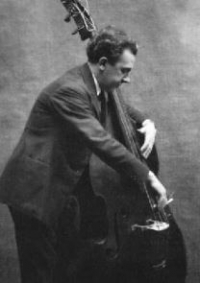
Édouard Nanny (March 24, 1872 in Saint-Germain-en-Laye – October 12, 1942 in Paris) was an important French double bass player, teacher, and composer. He was a longtime professor of double bass at the Paris Conservatory.Nanny was part of la Société de concerts des Instruments anciens. He gained some international exposure as a composer during his lifetime, although he never enjoyed the respect he received in France worldwide. Among his most famous works are his Concerto in E minor and his Enseignement Complet (a collection of pedagogical works including the 2-part Méthode complète pour la contrebasse à quatre et cinq cordes, the Vingt études de virtuosité, and his Dix étude-caprices).
Ryan P. Cullen
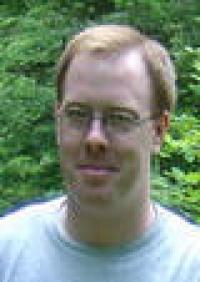
RYAN CULLEN is President and Editor at RYCUN Music Company. ... Mr. Cullen is a member of The American Society of Composers, Authors, and Publishers (ASCAP) ...
Marcos Valle
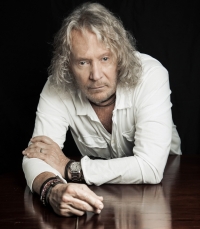
Marcos Kostenbader Valle is a Brazilian singer, songwriter, and record producer. He has produced works in many musical styles, including bossa nova, samba, and fusions of rock, soul, jazz, and dance music with Brazilian styles. Valle is regarded as one of the greatest Brazilian artists of all time.
Franz Schubert

Franz Peter Schubert (German pronunciation: ; January 31, 1797 – November 19, 1828) was an Austrian composer. He wrote some 600 Lieder, nine symphonies (including the famous "Unfinished Symphony"), liturgical music, operas, some incidental music, and a large body of chamber and solo piano music. He is particularly noted for his original melodic and harmonic writing.
Schubert was born into a musical family, and received formal musical training through much of his childhood. While Schubert had a close circle of friends and associates who admired his work (amongst them the prominent singer Johann Michael Vogl), wide appreciation of his music during his lifetime was limited at best. He was never able to secure adequate permanent employment, and for most of his career he relied on the support of friends and family. He made some money from published works, and occasionally gave private musical instruction. In the last year of his life he began to receive wider acclaim. He died at the age of 31 of "typhoid fever", a diagnosis which was vague at the time; several scholars suspect the real illness was tertiary syphilis.
Interest in Schubert's work increased dramatically in the decades following his death. Composers like Franz Liszt, Robert Schumann and Felix Mendelssohn discovered, collected, and championed his works in the 19th century, as did musicologist Sir George Grove. Franz Schubert is now widely considered to be one of the greatest composers in the Western tradition.
Schubert was born into a musical family, and received formal musical training through much of his childhood. While Schubert had a close circle of friends and associates who admired his work (amongst them the prominent singer Johann Michael Vogl), wide appreciation of his music during his lifetime was limited at best. He was never able to secure adequate permanent employment, and for most of his career he relied on the support of friends and family. He made some money from published works, and occasionally gave private musical instruction. In the last year of his life he began to receive wider acclaim. He died at the age of 31 of "typhoid fever", a diagnosis which was vague at the time; several scholars suspect the real illness was tertiary syphilis.
Interest in Schubert's work increased dramatically in the decades following his death. Composers like Franz Liszt, Robert Schumann and Felix Mendelssohn discovered, collected, and championed his works in the 19th century, as did musicologist Sir George Grove. Franz Schubert is now widely considered to be one of the greatest composers in the Western tradition.
John Scofield
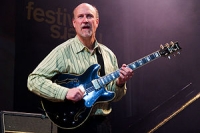
John Scofield (born December 26, 1951), sometimes referred to as "Sco", is an American jazz-rock guitarist and composer whose music includes bebop, jazz fusion, funk, blues, soul, and rock. He has worked with Miles Davis, Dave Liebman, Joe Henderson, Charles Mingus, Joey DeFrancesco, Herbie Hancock, Eddie Palmieri, Pat Metheny, Bill Frisell, Joe Lovano, Pat Martino, Mavis Staples, Phil Lesh, Billy Cobham, Medeski Martin & Wood, George Duke, Jaco Pastorius, John Mayer, Robert Glasper, and Gov't Mule.
Jean Sibelius

Jean Sibelius ( pronunciation (help·info)) (8 December 1865 – 20 September 1957) was a Finnish composer of the later Romantic period whose music played an important role in the formation of the Finnish national identity. His mastery of the orchestra has been described as "prodigious."
The core of Sibelius's oeuvre is his set of seven symphonies. Like Beethoven, Sibelius used each successive work to further develop his own personal compositional style. His works continue to be performed frequently in the concert hall and are often recorded.
In addition to the symphonies, Sibelius's best-known compositions include Finlandia, the Karelia Suite, Valse triste, the Violin Concerto in D minor and The Swan of Tuonela (one of the four movements of the Lemminkäinen Suite). Other works include pieces inspired by the Finnish national epic, the Kalevala; over 100 songs for voice and piano; incidental music for 13 plays; the opera Jungfrun i tornet (The Maiden in the Tower); chamber music; piano music; Masonic ritual music; and 21 separate publications of choral music.
The core of Sibelius's oeuvre is his set of seven symphonies. Like Beethoven, Sibelius used each successive work to further develop his own personal compositional style. His works continue to be performed frequently in the concert hall and are often recorded.
In addition to the symphonies, Sibelius's best-known compositions include Finlandia, the Karelia Suite, Valse triste, the Violin Concerto in D minor and The Swan of Tuonela (one of the four movements of the Lemminkäinen Suite). Other works include pieces inspired by the Finnish national epic, the Kalevala; over 100 songs for voice and piano; incidental music for 13 plays; the opera Jungfrun i tornet (The Maiden in the Tower); chamber music; piano music; Masonic ritual music; and 21 separate publications of choral music.
JOSE FELICIANO
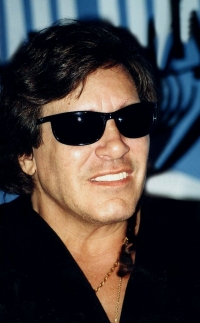
José Monserrate Feliciano García (born September 10, 1945), better known simply as José Feliciano , is a Puerto Rican musician, singer and composer, best known for many international hits, including his rendition of The Doors' "Light My Fire" and the best-selling Christmas single, "Feliz Navidad." His music is known for its fusion of styles: Latin, jazz, blues, soul and even rock, created primarily with his unique, signature acoustic guitar sound. His oftentimes mellow easy listening influences are easily recognizable in many songs heard around the world.
The Beatles

The Beatles were a pop and rock group from Liverpool, England formed in 1960. Primarily consisting of John Lennon (rhythm guitar, vocals), Paul McCartney (bass guitar, vocals), George Harrison (lead guitar, vocals) and Ringo Starr (drums, vocals) throughout their career, The Beatles are recognised for leading the mid-1960s musical "British Invasion" into the United States. Although their initial musical style was rooted in 1950s rock and roll and homegrown skiffle, the group explored genres ranging from Tin Pan Alley to psychedelic rock. Their clothes, styles, and statements made them trend-setters, while their growing social awareness saw their influence extend into the social and cultural revolutions of the 1960s. After the band broke up in 1970, all four members embarked upon solo careers.
The Beatles are one of the most commercially successful and critically acclaimed bands in the history of popular music, selling over a billion records internationally. In the United Kingdom, The Beatles released more than 40 different singles, albums, and EPs that reached number one, earning more number one albums (15) than any other group in UK chart history. This commercial success was repeated in many other countries; their record company, EMI, estimated that by 1985 they had sold over one billion records worldwide. According to the Recording Industry Association of America, The Beatles have sold more albums in the United States than any other band. In 2004, Rolling Stone magazine ranked The Beatles number one on its list of 100 Greatest Artists of All Time. According to that same magazine, The Beatles' innovative music and cultural impact helped define the 1960s, and their influence on pop culture is still evident today. In 2008, Billboard magazine released a list of top-selling Hot 100 artists to celebrate the chart's fiftieth anniversary; The Beatles reached #1 again.
The Beatles are one of the most commercially successful and critically acclaimed bands in the history of popular music, selling over a billion records internationally. In the United Kingdom, The Beatles released more than 40 different singles, albums, and EPs that reached number one, earning more number one albums (15) than any other group in UK chart history. This commercial success was repeated in many other countries; their record company, EMI, estimated that by 1985 they had sold over one billion records worldwide. According to the Recording Industry Association of America, The Beatles have sold more albums in the United States than any other band. In 2004, Rolling Stone magazine ranked The Beatles number one on its list of 100 Greatest Artists of All Time. According to that same magazine, The Beatles' innovative music and cultural impact helped define the 1960s, and their influence on pop culture is still evident today. In 2008, Billboard magazine released a list of top-selling Hot 100 artists to celebrate the chart's fiftieth anniversary; The Beatles reached #1 again.
Metallica

Metallica is an American heavy metal band that formed in 1981 in Los Angeles, California. Founded when drummer Lars Ulrich posted an advertisement in a Los Angeles newspaper, Metallica's original line-up consisted of Ulrich, rhythm guitarist and vocalist James Hetfield, lead guitarist Dave Mustaine, and bassist Ron McGovney. These last two were later replaced from the band, in favor of Kirk Hammett and Cliff Burton, respectively. In September 1986, Metallica's tour bus skidded out of control and flipped, which resulted in Burton being crushed under the bus and killed. Jason Newsted replaced him less than two months later. Newsted left the band in 2001 and was replaced by Robert Trujillo in 2003.
Metallica's early releases included fast tempos, instrumentals, and aggressive musicianship that placed them as one of the "Big Four" of the thrash metal subgenre alongside Slayer, Megadeth and Anthrax. The band earned a growing fan base in the underground music community, and some critics say the 1986 release Master of Puppets is one of the most influential and "heavy" thrash metal albums. The band achieved substantial commercial success with its self-titled 1991 album, which debuted at number one on the Billboard 200. Some critics and fans believed the band changed its musical direction to appeal to the mainstream audience. With the release of Load in 1996, Metallica distanced itself from earlier releases in what has been described as "an almost alternative rock approach", and the band faced accusations of "selling out".
In 2000, Metallica was among several artists who filed a lawsuit against Napster for sharing the band's copyright-protected material for free without the band members' consent. A settlement was reached, and Napster became a pay-to-use service. Despite reaching number one on the Billboard 200, the release of St. Anger in 2003 disappointed some critics and fans with the exclusion of guitar solos, and the "steel-sounding" snare drum. A film titled Some Kind of Monster documented the recording process of St. Anger.
Metallica's early releases included fast tempos, instrumentals, and aggressive musicianship that placed them as one of the "Big Four" of the thrash metal subgenre alongside Slayer, Megadeth and Anthrax. The band earned a growing fan base in the underground music community, and some critics say the 1986 release Master of Puppets is one of the most influential and "heavy" thrash metal albums. The band achieved substantial commercial success with its self-titled 1991 album, which debuted at number one on the Billboard 200. Some critics and fans believed the band changed its musical direction to appeal to the mainstream audience. With the release of Load in 1996, Metallica distanced itself from earlier releases in what has been described as "an almost alternative rock approach", and the band faced accusations of "selling out".
In 2000, Metallica was among several artists who filed a lawsuit against Napster for sharing the band's copyright-protected material for free without the band members' consent. A settlement was reached, and Napster became a pay-to-use service. Despite reaching number one on the Billboard 200, the release of St. Anger in 2003 disappointed some critics and fans with the exclusion of guitar solos, and the "steel-sounding" snare drum. A film titled Some Kind of Monster documented the recording process of St. Anger.
Mikis Theodorakis

Mikis (Michael) Theodorakis (Greek: Μίκης Θεοδωράκης) (born July 29, 1925, Greek island of Chios) is one of the most popular Greek songwriters and composers. Internationally, he is probably best known for his songs and for his scores for the films Zorba the Greek (1964), Z (1969), and Serpico (1973).
Politically, he identified with the left until the late 1980s; in 1989, he ran as an independent candidate within the centre-right New Democracy party in order for the country to come out of the political crisis that had been created due to the numerous scandals of the government of Andreas Papandreou and helped to establish a large coalition between conservatives, socialists and leftists. In 1990 he was elected to the parliament (as in 1964 and 1981), became a government minister under Constantine Mitsotakis, and fought against drugs and terrorism and for culture, education and better relations between Greece and Turkey. He continues to speak out in favor of left-liberal causes. He has consistently opposed oppressive regimes and was the key voice against the Greek Junta 1967-1974, which imprisoned him. He has expressed his views on Palestine, the War in Iraq, and Greek-Turkish-Cypriot relations. He has been mentioned as a candidate for the election as President of Greece, but he has refused to be considered.
Politically, he identified with the left until the late 1980s; in 1989, he ran as an independent candidate within the centre-right New Democracy party in order for the country to come out of the political crisis that had been created due to the numerous scandals of the government of Andreas Papandreou and helped to establish a large coalition between conservatives, socialists and leftists. In 1990 he was elected to the parliament (as in 1964 and 1981), became a government minister under Constantine Mitsotakis, and fought against drugs and terrorism and for culture, education and better relations between Greece and Turkey. He continues to speak out in favor of left-liberal causes. He has consistently opposed oppressive regimes and was the key voice against the Greek Junta 1967-1974, which imprisoned him. He has expressed his views on Palestine, the War in Iraq, and Greek-Turkish-Cypriot relations. He has been mentioned as a candidate for the election as President of Greece, but he has refused to be considered.
Madonna
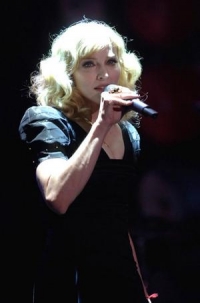
Madonna Louise Ciccone Ritchie (born August 16, 1958), known as Madonna, is an American recording artist and entertainer. Born in Bay City, Michigan and raised in Rochester Hills, Michigan, Madonna moved to New York City for a career in modern dance. After performing as member of the pop musical groups Breakfast Club and Emmy, she released her self-titled debut album in 1983, and then produced three consecutive number-one studio albums on the Billboard 200 in the 1980s.
Madonna is known for her works that explore religious symbolism and sexual themes which also drew criticism from the Vatican in the late 1980s. In 1992, she founded an entertainment company, Maverick, which published a book of photographs (Sex). She also released a studio album (Erotica) and starred in a film (Body of Evidence) with erotic themes. These works generated negative publicity and coincided with a fall in commercial sales in the 1990s. Madonna's career was revived in 1998, when the release of her album Ray of Light garnered critical acclaim. She subsequently made four consecutive number-one studio albums.
Madonna has acted in 22 films. Although several failed critically and commercially, she earned a Golden Globe Award for her role in the 1996 film Evita. Divorced from actor Sean Penn, Madonna bore a daughter by personal trainer Carlos Leon before marrying film director Guy Ritchie. She and Richie have a son and in 2008 they adopted a second, Malawian David Banda, over media allegations they violated that country's adoption laws.
Madonna is known for her works that explore religious symbolism and sexual themes which also drew criticism from the Vatican in the late 1980s. In 1992, she founded an entertainment company, Maverick, which published a book of photographs (Sex). She also released a studio album (Erotica) and starred in a film (Body of Evidence) with erotic themes. These works generated negative publicity and coincided with a fall in commercial sales in the 1990s. Madonna's career was revived in 1998, when the release of her album Ray of Light garnered critical acclaim. She subsequently made four consecutive number-one studio albums.
Madonna has acted in 22 films. Although several failed critically and commercially, she earned a Golden Globe Award for her role in the 1996 film Evita. Divorced from actor Sean Penn, Madonna bore a daughter by personal trainer Carlos Leon before marrying film director Guy Ritchie. She and Richie have a son and in 2008 they adopted a second, Malawian David Banda, over media allegations they violated that country's adoption laws.
The Knack
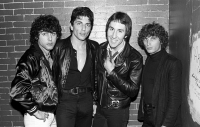
The Knack were an American rock band based in Los Angeles that rose to fame with its first single, "My Sharona", an international number-one hit in 1979.Singer Doug Fieger was a native of Oak Park, Michigan, a northern suburb of Detroit, Michigan, and grew up in the 9 Mile/Greenfield area. The brother of attorney Geoffrey Fieger (later known for representing Jack Kevorkian in a series of assisted suicide cases) Fieger had previously played in an eclectic rock band called Sky as well as the Sunset Bombers. Although Sky had received a modest amount of acclaim, including being produced by Rolling Stones producer Jimmy Miller, the band broke up without having any chart success. As a result, Fieger made the decision to move to Los Angeles and start another band.
Erik Mongrain
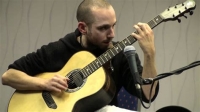
Erik Mongrain is a Canadian composer and guitarist. He has a unique and dark acoustic style, with a wide array of different techniques, approaches and textures reminiscent of Michael Hedges.
daddy yankee
Ramón Luis Ayala Rodríguez (born February 3, 1977), known professionally as Daddy Yankee, is a retired Puerto Rican rapper, singer, songwriter, and actor. Known as the "King of Reggaeton" by music critics and fans alike, he is the artist who coined the word reggaeton in 1991 in the mixtape Playero 34 in the song "So persigueme, no te detengas" to describe the new music genre that was emerging from Puerto Rico that synthesized American hip-hop, Hispanic Caribbean music, and Jamaican reggae rhythms with Spanish rapping and singing. He is often cited as an influence by other Hispanic urban performers.
Charles Mingus
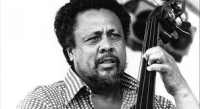
Charles Mingus Jr. (April 22, 1922 – January 5, 1979) was an American jazz double bassist, pianist, composer and bandleader. A major proponent of collective improvisation, he is considered to be one of the greatest jazz musicians and composers in history, with a career spanning three decades and collaborations with other jazz legends such as Louis Armstrong, Duke Ellington, Charlie Parker, Dizzy Gillespie, Dannie Richmond, and Herbie Hancock.
Mingus' compositions continue to be played by contemporary musicians ranging from the repertory bands Mingus Big Band, Mingus Dynasty, and Mingus Orchestra, to the high school students who play the charts and compete in the Charles Mingus High School Competition. In 1993, the Library of Congress acquired Mingus's collected papers—including scores, sound recordings, correspondence and photos—in what they described as "the most important acquisition of a manuscript collection relating to jazz in the Library's history"
Mingus' compositions continue to be played by contemporary musicians ranging from the repertory bands Mingus Big Band, Mingus Dynasty, and Mingus Orchestra, to the high school students who play the charts and compete in the Charles Mingus High School Competition. In 1993, the Library of Congress acquired Mingus's collected papers—including scores, sound recordings, correspondence and photos—in what they described as "the most important acquisition of a manuscript collection relating to jazz in the Library's history"
Hiroshi Yamazaki
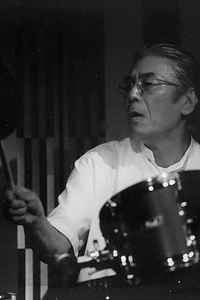
Hiroshi Yamazaki began playing classical piano at the age of seven in Osaka, Japan.As a young adult, he attended the Osaka College of Music. It was there where Hiroshi was introduced to jazz, the style of music that would quickly become his passion. At age 22, Hiroshi gave his first professional jazz performance, leading a trio at the popular S.A.B. Hall in Osaka. Shortly after completing his collegiate studies in Japan, Hiroshi moved to New York City. There, he continued to grow as a musician and a performer.
Bach

Johann Sebastian Bach (31 March 1685 – 28 July 1750) was a German composer and organist whose sacred and secular works for choir, orchestra, and solo instruments drew together the strands of the Baroque period and brought it to its ultimate maturity. Although he introduced no new forms, he enriched the prevailing German style with a robust contrapuntal technique, an unrivalled control of harmonic and motivic organisation in composition for diverse musical forces, and the adaptation of rhythms and textures from abroad, particularly Italy and France.
Revered for their intellectual depth and technical and artistic beauty, Bach's works include the Brandenburg concertos; the Goldberg Variations; the English Suites, French Suites, Partitas, and Well-Tempered Clavier; the Mass in B Minor; the St. Matthew Passion; the St. John Passion; The Musical Offering; The Art of Fugue; the Sonatas and Partitas for violin solo; the Cello Suites; more than 200 surviving cantatas; and a similar number of organ works, including the celebrated Toccata and Fugue in D Minor.
While Bach's fame as an organist was great during his lifetime, he was not particularly well-known as a composer. His adherence to Baroque forms and contrapuntal style was considered "old-fashioned" by his contemporaries, especially late in his career when the musical fashion tended towards Rococo and later Classical styles. A revival of interest and performances of his music began early in the 19th century, and he is now widely considered to be one of the greatest composers in the Western tradition.
Revered for their intellectual depth and technical and artistic beauty, Bach's works include the Brandenburg concertos; the Goldberg Variations; the English Suites, French Suites, Partitas, and Well-Tempered Clavier; the Mass in B Minor; the St. Matthew Passion; the St. John Passion; The Musical Offering; The Art of Fugue; the Sonatas and Partitas for violin solo; the Cello Suites; more than 200 surviving cantatas; and a similar number of organ works, including the celebrated Toccata and Fugue in D Minor.
While Bach's fame as an organist was great during his lifetime, he was not particularly well-known as a composer. His adherence to Baroque forms and contrapuntal style was considered "old-fashioned" by his contemporaries, especially late in his career when the musical fashion tended towards Rococo and later Classical styles. A revival of interest and performances of his music began early in the 19th century, and he is now widely considered to be one of the greatest composers in the Western tradition.
pat metheny
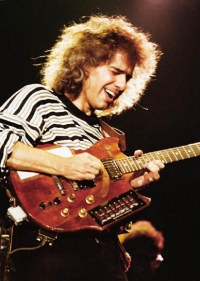
Patrick Bruce "Pat" Metheny (/məˈθiːni/ mə-thee-nee; born August 12, 1954) is an American jazz guitarist and composer.
He is the leader of the Pat Metheny Group and is also involved in duets, solo works and other side projects. His style incorporates elements of progressive and contemporary jazz, post-bop, latin jazz and jazz fusion. Pat Metheny has three gold albums and 20 Grammy Awards. He is the brother of jazz flugelhornist and journalist Mike Metheny.
He is the leader of the Pat Metheny Group and is also involved in duets, solo works and other side projects. His style incorporates elements of progressive and contemporary jazz, post-bop, latin jazz and jazz fusion. Pat Metheny has three gold albums and 20 Grammy Awards. He is the brother of jazz flugelhornist and journalist Mike Metheny.
Eagle Eye Cherry
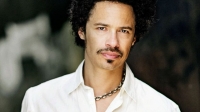
Eagle-Eye Lanoo Cherry is a Swedish singer and stage performer. His 1997 single "Save Tonight" achieved commercial success in Ireland, the United States and the United Kingdom, and was voted song of the year in New Zealand.
Boots Randolph
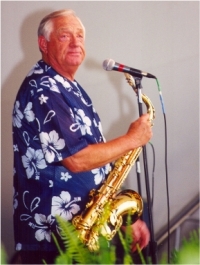
Homer Louis "Boots" Randolph III (June 3, 1927 – July 3, 2007) was an American musician best known for his 1963 saxophone hit "Yakety Sax" (which became Benny Hill's signature tune). Randolph was a major part of the "Nashville sound" for most of his professional career.
Al Green
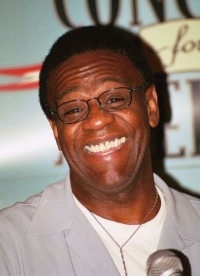
Albert Leornes Greene (born April 13, 1946), often known as The Reverend Al Green, is an American singer, songwriter and record producer; he is best known for recording a series of soul hit singles in the early 1970s, including "Take Me to the River", "Tired of Being Alone", "I'm Still in Love with You", "Love and Happiness", and his signature song, "Let's Stay Together". After an incident in which his girlfriend died by suicide, Green became an ordained pastor and turned to gospel music. He later returned to secular music.
Carlos Gardel

Carlos Gardel (11 December 1890 – 24 June 1935) was a singer, songwriter and actor, and is perhaps the most prominent figure in the history of tango. The unerring musicality of Gardel's baritone voice and the dramatic phrasing of his lyrics made miniature masterpieces of his hundreds of three-minute tango recordings. Together with lyricist and long-time collaborator Alfredo Le Pera, Gardel wrote several classic tangos, most notably "Mi Buenos Aires querido", "Por una cabeza" and "El día que me quieras".
Gardel died in an airplane crash at the height of his career, becoming an archetypal tragic hero mourned throughout Latin America. For many, Gardel embodies the soul of the tango style. He is commonly referred to as "Carlitos", "El Zorzal" (The Song Thrush), "The King of Tango", "El Mago" (The Magician) and "El Mudo" (The Mute).
Gardel died in an airplane crash at the height of his career, becoming an archetypal tragic hero mourned throughout Latin America. For many, Gardel embodies the soul of the tango style. He is commonly referred to as "Carlitos", "El Zorzal" (The Song Thrush), "The King of Tango", "El Mago" (The Magician) and "El Mudo" (The Mute).
Jamiroquai
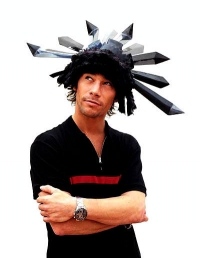
Jamiroquai is a Grammy Award-winning English acid jazz/funk/soul band. Jamiroquai was initially the most prominent component in the early-1990s London-based acid jazz movement, alongside groups such as Incognito, the Brand New Heavies, Galliano, and Corduroy. Subsequent albums have explored other musical directions such as, but not limited to, pop, rock and electronica. Jamiroquai has sold over 2.5 million records in the United States alone and over 21 million records all over the world.
The band name is a blend of Jam session and "iroquai", based on the Iroquois, a Native American tribe. The lineup of the band has changed several times, and the longest serving and now core members of the band are lead singer and songwriter Jason "Jay" Kay and drummer Derrick McKenzie (1994). Despite his self-professed attempts to treat Jamiroquai as a band, Kay has always been at the forefront of how the group is marketed, and has therefore always had the lion's share of media attention, to the point where he is viewed as almost a solo artist. He was the impetus behind the formation of Jamiroquai, deciding to form the band after an unsuccessful audition to become the singer of the Brand New Heavies.
The band name is a blend of Jam session and "iroquai", based on the Iroquois, a Native American tribe. The lineup of the band has changed several times, and the longest serving and now core members of the band are lead singer and songwriter Jason "Jay" Kay and drummer Derrick McKenzie (1994). Despite his self-professed attempts to treat Jamiroquai as a band, Kay has always been at the forefront of how the group is marketed, and has therefore always had the lion's share of media attention, to the point where he is viewed as almost a solo artist. He was the impetus behind the formation of Jamiroquai, deciding to form the band after an unsuccessful audition to become the singer of the Brand New Heavies.
Richard Wagner

Wilhelm Richard Wagner (pronounced /ˈvɑːɡnər/, German pronunciation: ; 22 May 1813 – 13 February 1883) was a German composer, conductor, theatre director and essayist, primarily known for his operas (or "music dramas", as they were later called). Wagner's compositions, particularly those of his later period, are notable for their complex texture, rich harmonies and orchestration, and the elaborate use of leitmotifs: musical themes associated with individual characters, places, ideas or plot elements. Unlike most other opera composers, Wagner wrote both the music and libretto for every one of his stage works. Famous extracts from his operas include the "Ride of the Valkyries" and the Bridal Chorus from Lohengrin, popularly known as the wedding march "Here Comes the Bride".
Initially establishing his reputation as a composer of works such as The Flying Dutchman and Tannhäuser which were in the romantic traditions of Weber and Meyerbeer, Wagner transformed operatic thought through his concept of the Gesamtkunstwerk ("total work of art"). This would achieve the synthesis of all the poetic, visual, musical and dramatic arts, and was announced in a series of essays between 1849 and 1852. Wagner realised this concept most fully in the first half of the monumental four-opera cycle Der Ring des Nibelungen. However, his thoughts on the relative importance of music and drama were to change again and he reintroduced some traditional operatic forms into his last few stage works including Die Meistersinger von Nürnberg.
Wagner pioneered advances in musical language, such as extreme chromaticism and quickly shifting tonal centres, which greatly influenced the development of European classical music. His Tristan und Isolde is sometimes described as marking the start of modern music. Wagner's influence spread beyond music into philosophy, literature, the visual arts and theatre. He had his own opera house built, the Bayreuth Festspielhaus, which contained many novel design features. It was here that the Ring and Parsifal received their premieres and where his most important stage works continue to be performed today in an annual festival run by his descendants. Wagner's views on conducting were also highly influential. His extensive writings on music, drama and politics have all attracted extensive comment; not least for their frequently antisemitic content.
Wagner achieved all of this despite a life characterised, until his last decades, by political exile, turbulent love affairs, poverty and repeated flight from his creditors. His pugnacious personality and often outspoken views on music, politics and society made him a controversial figure during his life. He has remained one to this day. The impact of his his ideas can be traced in many of the arts throughout the twentieth century.
Initially establishing his reputation as a composer of works such as The Flying Dutchman and Tannhäuser which were in the romantic traditions of Weber and Meyerbeer, Wagner transformed operatic thought through his concept of the Gesamtkunstwerk ("total work of art"). This would achieve the synthesis of all the poetic, visual, musical and dramatic arts, and was announced in a series of essays between 1849 and 1852. Wagner realised this concept most fully in the first half of the monumental four-opera cycle Der Ring des Nibelungen. However, his thoughts on the relative importance of music and drama were to change again and he reintroduced some traditional operatic forms into his last few stage works including Die Meistersinger von Nürnberg.
Wagner pioneered advances in musical language, such as extreme chromaticism and quickly shifting tonal centres, which greatly influenced the development of European classical music. His Tristan und Isolde is sometimes described as marking the start of modern music. Wagner's influence spread beyond music into philosophy, literature, the visual arts and theatre. He had his own opera house built, the Bayreuth Festspielhaus, which contained many novel design features. It was here that the Ring and Parsifal received their premieres and where his most important stage works continue to be performed today in an annual festival run by his descendants. Wagner's views on conducting were also highly influential. His extensive writings on music, drama and politics have all attracted extensive comment; not least for their frequently antisemitic content.
Wagner achieved all of this despite a life characterised, until his last decades, by political exile, turbulent love affairs, poverty and repeated flight from his creditors. His pugnacious personality and often outspoken views on music, politics and society made him a controversial figure during his life. He has remained one to this day. The impact of his his ideas can be traced in many of the arts throughout the twentieth century.
Arthur Pryor
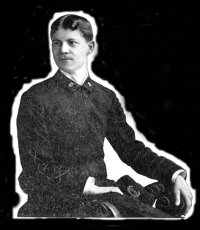
Arthur Willard Pryor was a trombone virtuoso, bandleader, and soloist with the Sousa Band. He was a prolific composer of band music, his best-known composition being "The Whistler and His Dog".
Tim Maia
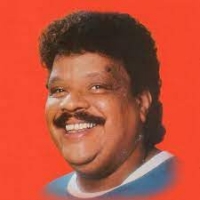
Tim Maia (Brazilian Portuguese: , born Sebastião Rodrigues Maia; September 28, 1942 – March 15, 1998) was a Brazilian musician, songwriter, and businessman known for his iconoclastic, ironic, outspoken, and humorous musical style. Maia contributed to Brazilian music within a wide variety of musical genres, including soul, funk, bossa nova, disco, romantic ballads, pop, rock, jazz, baião and música popular brasileira (MPB). He introduced the soul style on the Brazilian musical scene. Along with Jorge Ben, Maia pioneered MPB's samba rock genre, combining samba, soul, and funk. He is recognized as one of the biggest icons in Brazilian music.Tim Maia recorded numerous albums and toured extensively in a long career. After his death in 1998, his recorded oeuvre has shown enduring popularity. A theatrical retrospective of his career, the popular musical Vale Tudo, was first staged in Rio de Janeiro in 2012.
Astor Piazzola

Astor Pantaleón Piazzolla (Spanish pronunciation: , Italian pronunciation: ; March 11, 1921 – July 4, 1992) was an Argentine tango composer, bandoneon player, and arranger. His oeuvre revolutionized the traditional tango into a new style termed nuevo tango, incorporating elements from jazz and classical music. A virtuoso bandoneonist, he regularly performed his own compositions with a variety of ensembles.
In 1992, American music critic Stephen Holden described Piazzolla as "the world's foremost composer of tango music"
In 1992, American music critic Stephen Holden described Piazzolla as "the world's foremost composer of tango music"
Mozart

Wolfgang Amadeus Mozart, full name Johann Chrysostom Wolfgang Amadeus Mozart (27 January 1756 â 5 December 1791) was a prolific and influential composer of the Classical era. His over 600 compositions include works widely acknowledged as pinnacles of symphonic, concertante, chamber, piano, operatic, and choral music. Mozart is among the most enduringly popular of classical composers, and many of his works are part of the standard concert repertoire.
Mozart's music, like Haydn's, stands as an archetypal example of the Classical style. His works spanned the period during which that style transformed from one exemplified by the style galant to one that began to incorporate some of the contrapuntal complexities of the late Baroque, complexities against which the galant style had been a reaction. Mozart's own stylistic development closely paralleled the development of the classical style as a whole. In addition, he was a versatile composer and wrote in almost every major genre, including symphony, opera, the solo concerto, chamber music including string quartet and string quintet, and the piano sonata. While none of these genres were new, the piano concerto was almost single-handedly developed and popularized by Mozart. He also wrote a great deal of religious music, including masses; and he composed many dances, divertimenti, serenades, and other forms of light entertainment.
The central traits of the classical style can be identified in Mozart's music. Clarity, balance, and transparency are hallmarks of his work.
Mozart's music, like Haydn's, stands as an archetypal example of the Classical style. His works spanned the period during which that style transformed from one exemplified by the style galant to one that began to incorporate some of the contrapuntal complexities of the late Baroque, complexities against which the galant style had been a reaction. Mozart's own stylistic development closely paralleled the development of the classical style as a whole. In addition, he was a versatile composer and wrote in almost every major genre, including symphony, opera, the solo concerto, chamber music including string quartet and string quintet, and the piano sonata. While none of these genres were new, the piano concerto was almost single-handedly developed and popularized by Mozart. He also wrote a great deal of religious music, including masses; and he composed many dances, divertimenti, serenades, and other forms of light entertainment.
The central traits of the classical style can be identified in Mozart's music. Clarity, balance, and transparency are hallmarks of his work.
Robbie Williams
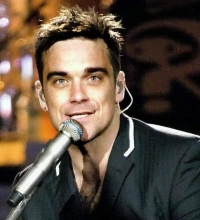
Robert Peter Maximilian Williams (born 13 February 1974) is a Grammy Award-nominated, 15-time BRIT Award-winning English singer-songwriter. His career started as a member of the pop band Take That in 1990. He left Take That in 1995 to begin his solo career, after selling 25 million records with the group.
His album sales stand at over 55 million, with singles sales over 17 million.
Williams entered the The Guinness Book of World Records when in just one day he sold more than 1.6 million tickets for his 2006 world tour. He has been the recipient of many awards, including fifteen BRIT and six ECHO awards. In 2004, he was inducted into the UK Music Hall of Fame, after being voted as the Greatest artist of the 1990s.
Robbie Williams is the artist who is currently featured the most times in the UK Now That's What I Call Music! series. In the first 68 Now!s he has appeared 29 times (including 4 times with Take That). His first appearance was with Take That on Now 22 and his most recent appearance was on Now 66 with "She's Madonna".
His album sales stand at over 55 million, with singles sales over 17 million.
Williams entered the The Guinness Book of World Records when in just one day he sold more than 1.6 million tickets for his 2006 world tour. He has been the recipient of many awards, including fifteen BRIT and six ECHO awards. In 2004, he was inducted into the UK Music Hall of Fame, after being voted as the Greatest artist of the 1990s.
Robbie Williams is the artist who is currently featured the most times in the UK Now That's What I Call Music! series. In the first 68 Now!s he has appeared 29 times (including 4 times with Take That). His first appearance was with Take That on Now 22 and his most recent appearance was on Now 66 with "She's Madonna".
Luiz Bonfa
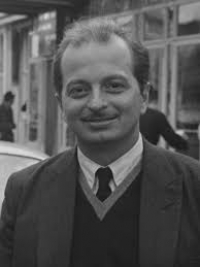
Luiz Floriano Bonfá (17 October 1922 – 12 January 2001) was a Brazilian guitarist and composer. He was best known for the compositions he penned for the film Black Orpheus.Luiz Floriano Bonfá was born on October 17, 1922, in Rio de Janeiro. He studied in Rio with Uruguayan classical guitarist Isaías Sávio from the age of 11. These weekly lessons entailed a long, harsh commute by train (2 1/2 hours one way) and on foot from his family home in Santa Cruz, the western rural outskirts of Rio de Janeiro to the teacher's home in the hills of Santa Teresa. Given Bonfá's extraordinary dedication and talent for the guitar, Sávio excused the youngster's inability to pay for his lessons.
Wayne shorter
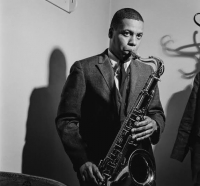
Wayne Shorter is an American jazz saxophonist and composer. More recently, in the late 1950s, he emerged as the primary composer and member of Art Blakey's Jazz Reporters. He joined Miles Davis' Second Big Five in the 1960s, where he founded the jazz fusion group Weather Report. More than 20 albums
Frank Sinatra

Francis Albert "Frank" Sinatra (December 12, 1915 â May 14, 1998) was an American singer and actor.
Beginning his musical career in the swing era with Harry James and Tommy Dorsey, Sinatra became a solo artist with great success in the early to mid-1940s, being the idol of the "bobby soxers". His professional career had stalled by the 1950s, but it was reborn in 1954 after he won the Academy Award for Best Supporting Actor.
He signed with Capitol Records and released several critically lauded albums (such as In the Wee Small Hours, Songs for Swingin' Lovers, Come Fly with Me, Only the Lonely and Nice 'n' Easy). Sinatra left Capitol to found his own record label, Reprise Records (finding success with albums such as Ring-A-Ding-Ding, Sinatra at the Sands and Francis Albert Sinatra & Antonio Carlos Jobim), toured internationally, and fraternized with the Rat Pack and President John F. Kennedy in the early 1960s. Sinatra turned 50 in 1965, recorded the retrospective September of My Years, starred in the Emmy-winning television special Frank Sinatra: A Man and His Music, and scored hits with "Strangers in the Night" and "My Way".
Sinatra attempted to weather the changing tastes in popular music, but with dwindling album sales and after appearing in several poorly received films, he retired in 1971. Coming out of retirement in 1973, he recorded several albums, scoring a hit with "(Theme From) New York, New York" in 1980, and toured both within the United States and internationally until a few years before his death in 1998.
Sinatra also forged a career as a dramatic actor, winning the Academy Award for Best Supporting Actor for his performance in From Here to Eternity, and he was nominated for the Academy Award for Best Actor for The Man with the Golden Arm. His also starred in such musicals as High Society, Pal Joey, Guys and Dolls and On the Town. Sinatra was honored with the Kennedy Center Honors in 1983 and awarded the Presidential Medal of Freedom by Ronald Reagan in 1985 and the Congressional Gold Medal in 1997. Sinatra was also the recipient of eleven Grammy Awards, including the Grammy Trustees Award, Grammy Legend Award and the Grammy Lifetime Achievement Award.
Beginning his musical career in the swing era with Harry James and Tommy Dorsey, Sinatra became a solo artist with great success in the early to mid-1940s, being the idol of the "bobby soxers". His professional career had stalled by the 1950s, but it was reborn in 1954 after he won the Academy Award for Best Supporting Actor.
He signed with Capitol Records and released several critically lauded albums (such as In the Wee Small Hours, Songs for Swingin' Lovers, Come Fly with Me, Only the Lonely and Nice 'n' Easy). Sinatra left Capitol to found his own record label, Reprise Records (finding success with albums such as Ring-A-Ding-Ding, Sinatra at the Sands and Francis Albert Sinatra & Antonio Carlos Jobim), toured internationally, and fraternized with the Rat Pack and President John F. Kennedy in the early 1960s. Sinatra turned 50 in 1965, recorded the retrospective September of My Years, starred in the Emmy-winning television special Frank Sinatra: A Man and His Music, and scored hits with "Strangers in the Night" and "My Way".
Sinatra attempted to weather the changing tastes in popular music, but with dwindling album sales and after appearing in several poorly received films, he retired in 1971. Coming out of retirement in 1973, he recorded several albums, scoring a hit with "(Theme From) New York, New York" in 1980, and toured both within the United States and internationally until a few years before his death in 1998.
Sinatra also forged a career as a dramatic actor, winning the Academy Award for Best Supporting Actor for his performance in From Here to Eternity, and he was nominated for the Academy Award for Best Actor for The Man with the Golden Arm. His also starred in such musicals as High Society, Pal Joey, Guys and Dolls and On the Town. Sinatra was honored with the Kennedy Center Honors in 1983 and awarded the Presidential Medal of Freedom by Ronald Reagan in 1985 and the Congressional Gold Medal in 1997. Sinatra was also the recipient of eleven Grammy Awards, including the Grammy Trustees Award, Grammy Legend Award and the Grammy Lifetime Achievement Award.
Wynton Marsalis
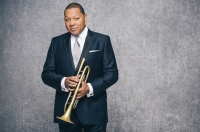
Wynton Learson Marsalis (born October 18, 1961) is an American trumpeter, composer, teacher, and artistic director of Jazz at Lincoln Center. He has promoted classical and jazz music, often to young audiences. Marsalis has won at least nine Grammy Awards, and his Blood on the Fields was the first jazz composition to win the Pulitzer Prize for Music. He is the only musician to win a Grammy Award in jazz and classical during the same year.
Joao Donato
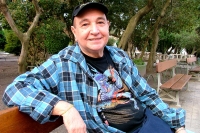
João Donato de Oliveira Neto is a Brazilian jazz and bossa nova pianist from Brazil. He first worked with Altamiro Carrilho and went on to perform with Antonio Carlos Jobim and Astrud Gilberto.A professional at the age of 15, Donato played accordion at the Sinatra-Farney Fan Club.He recorded for the first time with Altamiro Carrilho. Soon after he joined a band led by violinist Fafá Lemos that played in Brazilian nightclubs. His first solo album came out in 1953. He led the bossa nova band Os Namorados which performed songs such as "Tenderly".
Bob Marley
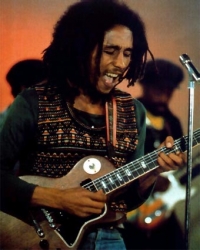
Robert "Bob" Nesta Marley OM (February 6, 1945 – May 11, 1981) was a Jamaican musician, singer-songwriter and Rastafarian. He was the lead singer, songwriter and guitarist for the ska, rocksteady and reggae bands: The Wailers (1964 – 1974) and Bob Marley & the Wailers (1974 – 1981). Marley died nearly thirty years ago, but remains the most widely known and revered performer of reggae music, and is credited for helping spread Jamaican music to the worldwide audience.
Marley's best known hits include "I Shot the Sheriff", "No Woman, No Cry", "Exodus", "Could You Be Loved", "Stir It Up", "Jamming", "Redemption Song", "One Love" and, together with The Wailers, ""Three Little Birds",
Marley's best known hits include "I Shot the Sheriff", "No Woman, No Cry", "Exodus", "Could You Be Loved", "Stir It Up", "Jamming", "Redemption Song", "One Love" and, together with The Wailers, ""Three Little Birds",
Thelonious Monk
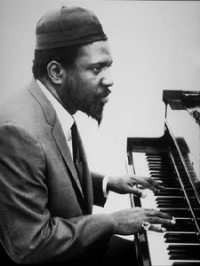
Thelonious Sphere Monk was an American jazz pianist and composer. He had a unique improvisational style and made numerous contributions to the standard jazz repertoire, including "'Round Midnight", "Blue Monk", "Straight, No Chaser", "Ruby, My Dear", "In Walked Bud", and "Well, You Needn't"
Jerry Bock
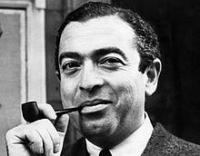
Jerrold Lewis "Jerry" Bock (November 23, 1928 – November 3, 2010) was an American musical theater composer. He received the Tony Award for Best Musical and the Pulitzer Prize for Drama with Sheldon Harnick for their 1959 musical Fiorello! and the Tony Award for Best Composer and Lyricist for the 1964 musical Fiddler on the Roof with Harnick.
Ricky King
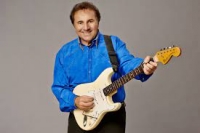
Ricky King (born Hans Lingenfelder March 12, 1946 in Rastatt, Baden-Württemberg) is a German guitarist. His singles "Verde" and "Le rêve" reached the top ten in Germany, Austria, and Switzerland in 1976. and number 65 in Australia in 1977.
Giovanni Bottesini
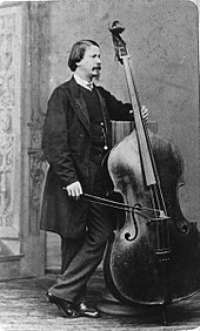
Giovanni Bottesini (22 December 1821 – 7 July 1889), was an Italian Romantic composer, conductor, and a double bass virtuoso.Born in Crema, Lombardy, he was taught the rudiments of music by his father, an accomplished clarinetist and composer, at a young age and had played timpani in Crema with the Teatro Sociale before the age of eleven. He studied violin with Carlo Cogliati, and probably would have continued on this instrument except for a unique turn of events. His father sought a place for him in the Milan Conservatory, but due to the Bottesini family's lack of money, Bottesini needed a scholarship.
Charles Fox
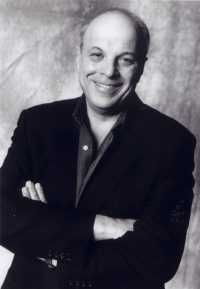
Charles Fox (born October 30, 1940 in New York City), is a composer for film and television. His most heard compositions are probably the "love themes" (the sunshine pop musical backgrounds which accompanied every episode of the 1970s ABC-TV show Love, American Style), and the dramatic theme music to ABC's Wide World of Sports.
His career started by playing the piano for, composing and arranging for artists such as Ray Barretto, Joe Quijano and Tito Puente. He also wrote theme music and arranged for Skitch Henderson and the Tonight Show Orchestra. Fox worked under the banner of Bob Israel's Score Productions where he composed the themes for several Goodson-Todman game shows including The Match Game (NBC version), What's My Line? (syndicated version) and To Tell the Truth (lyrics by director Paul Alter). He co-composed the theme song for Love, American Style, along with Arnold Margolin. He also co-composed "Killing Me Softly with His Song" with Norman Gimbel in 1971, which was first recorded by Lori Lieberman. They later wrote the theme songs to films and programs such as Last American Hero ("I Got A Name", sung by Jim Croce), Happy Days, Laverne and Shirley, and The New Adventures of Wonder Woman.
His career started by playing the piano for, composing and arranging for artists such as Ray Barretto, Joe Quijano and Tito Puente. He also wrote theme music and arranged for Skitch Henderson and the Tonight Show Orchestra. Fox worked under the banner of Bob Israel's Score Productions where he composed the themes for several Goodson-Todman game shows including The Match Game (NBC version), What's My Line? (syndicated version) and To Tell the Truth (lyrics by director Paul Alter). He co-composed the theme song for Love, American Style, along with Arnold Margolin. He also co-composed "Killing Me Softly with His Song" with Norman Gimbel in 1971, which was first recorded by Lori Lieberman. They later wrote the theme songs to films and programs such as Last American Hero ("I Got A Name", sung by Jim Croce), Happy Days, Laverne and Shirley, and The New Adventures of Wonder Woman.
Britney Spears

Britney Jean Spears (born 2 December 1981) is an American singer and entertainer. Born in McComb, Mississippi and raised in Kentwood, Louisiana, Spears first appeared on national television as a contestant on the Star Search program in 1992 and went on to star on the television series The New Mickey Mouse Club from 1993–1994. After a brief membership with the pop musical group Innosense, Spears signed a recording contract with Jive Records, releasing her debut album ...Baby One More Time in 1999 which debuted at number one on the Billboard 200.
The title-track of Spears's debut album and its accompanying music video also established her as an international sex symbol, garnering controversy over the influence of her public image on teenage girls.
Spears is ranked as the eighth best-selling female recording artist in the United States according to the Recording Industry Association of America with 31 million certified albums and one of the world's best-selling music artists having sold an estimated 83 million records worldwide.
The title-track of Spears's debut album and its accompanying music video also established her as an international sex symbol, garnering controversy over the influence of her public image on teenage girls.
Spears is ranked as the eighth best-selling female recording artist in the United States according to the Recording Industry Association of America with 31 million certified albums and one of the world's best-selling music artists having sold an estimated 83 million records worldwide.
 Sheet Music Mobile is a site for those who wants to access popular sheet music easily,
letting them download the sheet music for free for trial purposes.
It's completely free to download and try the listed sheet music, but you have to delete the files after 24 hours of trial.
Don't forget, if you like the piece of music you have just learned playing,
treat the artist with respect, and go buy the original sheet music.
Sheet Music Mobile is a site for those who wants to access popular sheet music easily,
letting them download the sheet music for free for trial purposes.
It's completely free to download and try the listed sheet music, but you have to delete the files after 24 hours of trial.
Don't forget, if you like the piece of music you have just learned playing,
treat the artist with respect, and go buy the original sheet music.


